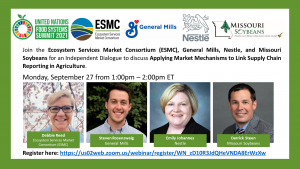نوع الحوار
بدعوة من
لغة فعالية الحوار
التاريخ/الوقت
إلى:
المدينة
نطاق التركيز الجغرافي
التنسيق
يُرجى مراجعة التفاصيل أدناه للحصول على معلومات التسجيل إذا كانت متوفرة أو الاتصال بمنظم الحوار إذا كنت ترغب في الحضور.
الوصف
Join the Ecosystem Services Market Consortium (ESMC), General Mills, Nestle, and Missouri Soybeans on September 27 at 1:00pm ET for an Independent Dialogue on Applying Market Mechanisms to Link Supply Chains in Agriculture, featuring representatives from ESMC members in the food and beverage sector and commodity producers.
In addition to reducing their direct Scope 1 GHG inventories, many companies have also pledged to reduce their indirect Scope 3 supply chain emissions by undertaking interventions with their suppliers to reduce their respective GHG emissions. In the agriculture sector, food and beverage companies can work with the farmers and ranchers they purchase goods from to achieve lower emissions and make claims about these reductions in their annual ESG reports. Since few corporate food companies produce their own raw materials – and agricultural products often have large GHG footprints – many of these companies have significantly higher Scope 3 supply chain emissions than Scope 1 operational emissions. It is not uncommon, for instance, for a food and beverage company’s supply chain GHG footprint to account for 90% of its total GHG inventory. ESMC’s market program enables food and beverage companies and their agricultural suppliers to reduce this footprint and generate quantified, verified outcomes that meet corporate reporting requirements on an annual basis.
Participants will describe how they are working with ESMC to generate quantified, verified, and certified GHG emissions reductions and improved water quality outcomes from agriculture. With the help of its partners, ESMC will generate soil carbon, net GHG and water quality assets to meet corporate reporting requirements and improve resilience throughout the agricultural supply and value chain. Participants will focus on the economics of climate smart agriculture – particularly given the current farm economy – and how ESMC and partners seek to scale climate impact and improve farmer returns.
Register in advance here: https://us02web.zoom.us/webinar/register/WN_zD10R3JdQHeVNDA8ErWzXw


